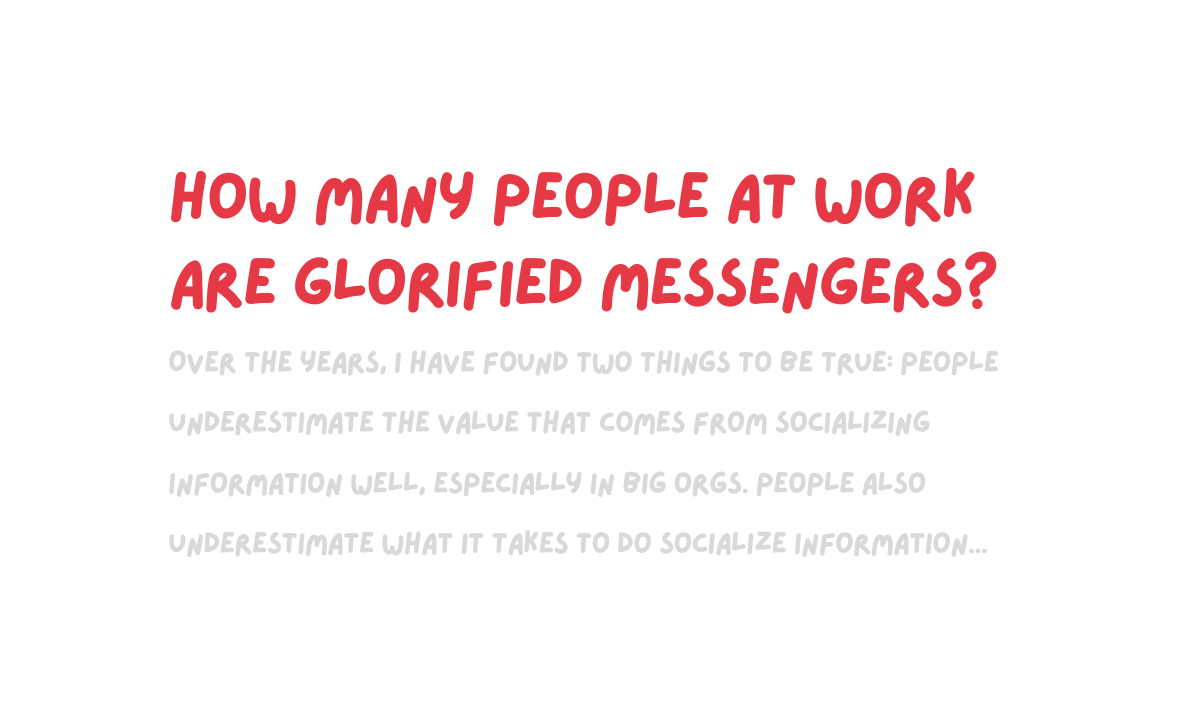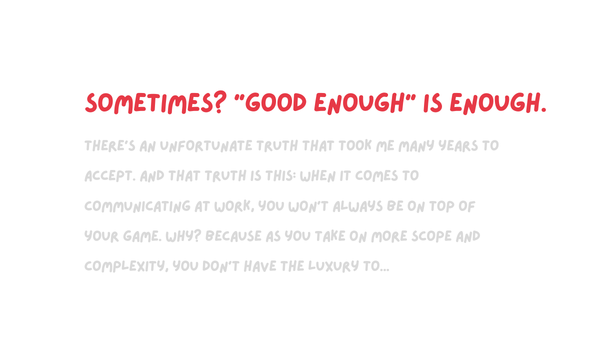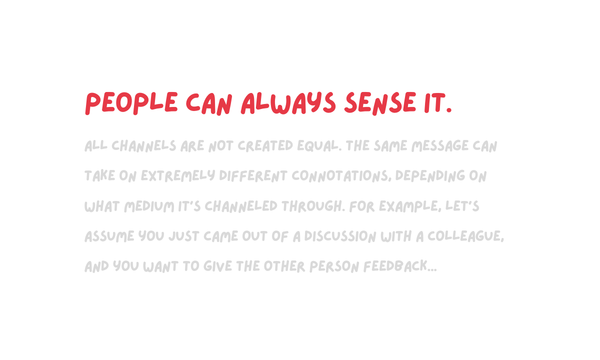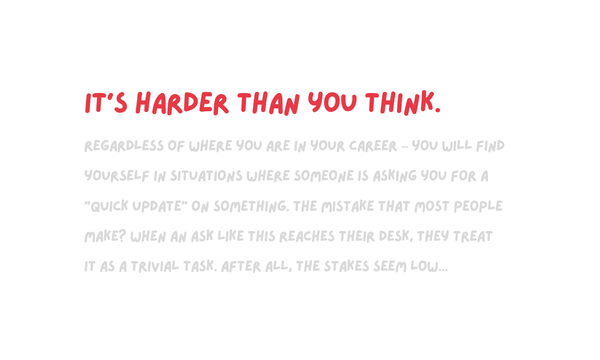Are you a mediocre or masterful messenger?
Don't be the person who "just" forwards emails.

When I first joined Google, I spent my first few weeks learning about different cross-functional teams and what they worked on.
My informal onboarding was done by a colleague, who patiently explained to me what each team worked on. But for one team in particular, he half-jokingly quipped:
"This team? They just forward emails to us."
He was both right and wrong.
You see, my colleague's sarcasm was partly justified. Clearly he felt that something was missing in his previous interactions with that team. He expected more than just information dissemination (rightfully so), and clearly not everyone met his bar.
But he was also not entirely right. Because I would learn later on that folks on this team played a critical role in activating product strategy (and most were great at it). So in that sense he was mistaken: this team did way more than just forward emails.
So why the disconnect?
The truth about "messengers" at work
Over the years, I have found two things to be true:
- People underestimate the value that comes from socializing information well – especially in big organizations.
- People also underestimate what it takes to do socialize information well. They usually don't do enough.
In my story, the issue was never about whether folks on that team were glorified messengers or not. Everybody plays some kind of messenger role sometimes; there is nothing inherently pejorative about it.
But of course, there are mediocre messengers – and then there are masterful messengers.
And in today's issue, we'll talk about what separates them.
Let's start by talking about the common symptoms of a "mediocre" messenger.
❌ Lack of curation
The mediocre messenger believes that more is better (or at least can't hurt). So they do things like:
- Write (or forward) a ton of emails
- Provide extreme detail during updates
- Passes on all messages equally, unfiltered
But it turns out that oversupply of information is just as harmful as undersupply. Well-intentioned attempts to increase transparency and share information can easily end up creating stakeholder fatigue.
(Case in point: we all know that one person who forwards anything and everything.)
Information dissemination isn't just about maximizing the flow. It's about controlling it.
❌ Lack of context
Mediocre messengers simply pass on information. They forget to help contextualize (or even commentate) to help their audience make sense of whatever information they're socializing.
So they end up doing things like:
- Giving people detailed updates (but not establishing why people should care)
- Forwarding many documents to people (but neglecting to call out the sections that matter)
- Passing on requests to people (but failing to justify the urgency and importance)
Mediocre messengers simply receive information and pass it on – instead of finding ways to turn it into actionable intelligence.
So what do "masterful" messengers do in comparison?
👋 Subscribe for free to get Herng's newsletter directly in your inbox.
✅ They curate – aggressively.
Masterful messengers understand that attention is precious. So they curate the information that goes in front of their stakeholders, and help people figure out what to do next.
What does good curation look like in practice? A couple examples:
- You don't forward or share every piece of information just because it could be useful. Instead, you prioritize what's most important – and you find ways to synthesize the rest.
- You recognize the fatigue that arises from "drip-feeding." So instead of updating people whenever a new piece of info comes in (and doing it 4 times over 7 days), you think ahead – and you communicate only when it makes sense.
In fact, curation isn't just about taking a subset of what you're given and passing it on. The value-add of that is rather capped.
Instead, the best operators actively lean in and get their hands dirty. They do everything they can to make digesting (and acting) on information as easy as possible.
For instance, imagine that you are in charge of a particular market, and you work with a regional program manager who serves as your conduit to headquarters.
Which of the following messages from this program manager might add the most value to you?
Compare this:
"Hi there – headquarters has asked each of the country leads to prepare a few slides on XYZ topic by end of next week. Please send them to me once done so I can aggregate them into a regional view."
...with this:
"Hi there – there's an ask for country teams to submit feedback on XYZ topic. This ask arose out of a leadership discussion, where leaders A and B agreed to prioritize fixing our intel gap on XYZ (I can give you more color when we catch up live). While there is no prescribed format, I recommend simply using this two-slide template I've developed for us. I also recommend spending no more than 20 minutes on it – it does not need to be polished by any means, as I will distill the deliverables into XYZ format.
I've gone a little wordier for illustrative purposes, but the point here is this: masterful messengers go the extra mile to empower their stakeholders while saving them time.
👋 Subscribe for free to get Herng's newsletter directly in your inbox.
✅ They connect the dots.
Masterful messengers challenge themselves to see the full picture. Their goal is to connect the dots for others as well.
As a result, they won't only say things like:
Here is a summary of my takeaways from this product strategy summit I attended. For more detail, here are the presentation decks.
Instead, you might hear them say:
Here are my 5 key takeaways from this product strategy summit I attended. Note that #1 and #3 are highly relevant for our team's OKRs this quarter, while #2 provides proof points that may help our sales team sell better.
There's no rocket science involved. But masterful messengers practice the discipline of asking some key questions before they ever demand others' attention. For example, they ask:
- How does this information help others do their job better?
- What outcomes do I want to see (and from whom) as a result?
- How does this information complement, reinforce, or even contradict extant knowledge?
This is what "connecting the dots" means. For the masterful messenger, it isn't just about transmitting new pieces of information over and over again. That simply leads to stakeholder fatigue.
Instead, it's about anchoring each new piece of information in the existing universe.
👋 Subscribe for free to get Herng's newsletter directly in your inbox.
✅ They go upstream.
Mediocre messengers take information and give it on to someone else. They see it as a unilateral process.
Masterful messengers, on the other hand, see themselves as having a say in the process. So when they spot an opportunity for things to be done better? They speak up and challenge the status quo.
What does this look like in practice? Consider again our earlier example of a regional program manager who wants to gather feedback from local markets.
The mediocre messenger simply adheres to the existing process and executes (and maybe optimizes it slightly over time).
Meanwhile, the masterful messenger asks themselves things like:
- What is the objective of the exercise? What decisions will it enable?
- Is this the most effective way for our feedback to be surfaced?
- Is this a good use of time for my stakeholders? Are there risks of it causing unintended swirl?
- Does this process seem duplicative vs. other processes? Can we leverage or repurpose existing materials (and give people time back)?
Once you start asking these questions, you're no longer "just" a messenger. You're no longer just taking orders and executing. You're no longer just summarizing or paraphrasing.
Instead, you've demonstrated extreme ownership, which pushes you to find ways to achieve the same objective more effectively.
For example, you might recognize that the same ask will come in again multiple times, and that the most effective thing to do is to build a reference document.
Or, instead of asking people to work on slides? You might propose setting up a live discussion, which could be more efficient and ensure nuance doesn't get lost.
Whatever it is, masterful messengers think of themselves as more than just messengers.
Sure, they socialize information well – but they do so much more than just that.


